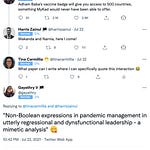This week…
I rejoice at the news of the death of Google AMP (Marko Saric, Plausible). Whether it is due to antitrust scrutiny or pushbacks from publishers, I don't really care, because it has made it harder to spot misinformation, among many of its issues (Dan Buben, on Medium). Meanwhile, a rescue mission for Sci-Hub is underway before its death, with the ultimate aim of building a decentralised version (Glyn Moody, TechDirt).
And for our interview segment, I speak with writer, actor, and director Jo Kukathas of The Instant Cafe Theatre Company about political satire. You can find the full transcript at the link below. But first, a selection of top stories on my radar, a few personal recommendations, and the chart of the week.
The disinformation dozen
Joseph Mercola and Robert F. Kennedy, Jr. are among the 12 responsible for up to 65 per cent of anti-vaccine content – at least English ones – according to a report by the Center for Countering Digital Hate. Speaking to NPR’s Shannon Bond, CEO Imran Ahmed said they sometimes skirt the platforms’ rules by using codes:
Instead of saying ‘vaccine,’ they may, in a video, hold up the V sign with their fingers and say, “If you're around someone who has been” — hold up V sign — “you know, X might happen to you.”
The disinformation threat from text-generating AI
A new report by Ben Buchanan et al. at Georgetown’s Center for Security and Emerging Technology details how language models could change disinformation. Bryan Walsh writes for Axios:
While “no currently existing autonomous system could replace the entirety of the IRA,” algorithmically based tech paired with experienced human operators produces results that are nothing less than frightening.
Like many other automation and AI technologies, GPT-3’s real power is in its ability to scale, says Ben Buchanan, director of the CyberAI Project at CSET and a co-author of the report.
GPT-3 “lets operators try a bunch of variants on a message and see what sticks,” he says. “The scale might lead to more effective feedback loops and iterations.”
Correcting falsehoods on Twitter makes misinformation worse
According to an MIT study by Moshen Mosleh et al., publicly and politely correcting misinformation on Twitter “set off an avalanche of further misinformation and toxic language.” Arianne Cohen for Fast Company:
The researchers targeted 2,000 Twitter users from a range of political persuasions who had tweeted 11 overtly false news articles. (Sample article topic: One time Donald Trump evicted a disabled veteran because of his therapy dog.) After an extremely polite correction in the thread, which included a link to factually accurate information, the tweeters’ accuracy declined further—and even more so when they were corrected by someone matching their political leanings. This indicates that partisanship is not driving the tweeters’ responses.
What I read, watch and listen to…
I’m reading the essay “The Crystal Goblet, or Printing Should Be Invisible” by Beatrice Warde, with these brilliant lines about typology:
If books are printed in order to be read, we must distinguish readability from what the optician would call legibility. A page set in 14-pt Bold Sans is, according to the laboratory tests, more ‘legible’ than one set in 11-pt Baskerville. A public s peaker is more ‘audible’ in that sense when he bellows. But a good speaking voice is one which is inaudible as a voice. It is the transparent goblet again! […] Type well used is invisible as type, just as the perfect talking voice is the unnoticed vehicle for the transmission of words, ideas.
I’m watching a short film by James Graham for FT, featuring a minimalist interrogation scene that “explores how COVID-19 has exposed the tension between the need for data to track and trace, and the right to privacy and justice.”
Chart of the week
On the subject of publicly correcting someone on Twitter, which didn’t work (I was blocked and had to switch accounts to ensure that the original tweet was still up), here’s a tweet with a fake chart of the week about Canadian media bias, which features the logo of a very Malaysian newspaper, The Star — not to be confused with the Canadian broadsheet, Toronto Star. (Yellow circle is added for emphasis.)
















Share this post